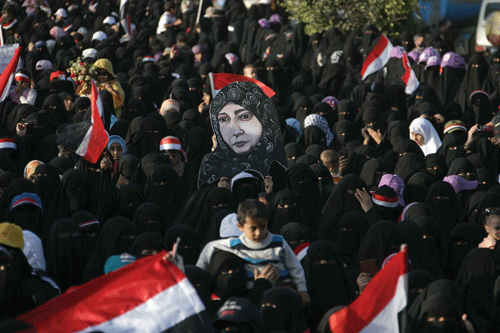Yemenis, from the deposed dictator Ali Abdullah Saleh to the angry street protesters, can all agree on one thing: Their country’s women have amazed the world with their extraordinary work during the 2011 uprisings. That recognition reached its zenith when the Nobel committee acknowledged the well-known Yemeni activist Tawakul Karman by awarding her the Peace Prize, along with two Liberians.
Since Saleh signed the Gulf Cooperation Council deal in November, which declares that he will step down next February, Yemenis have debated whether the political revolution is complete and what new political freedoms will emerge. Yet while the outcome of the political revolution is still unclear, the cultural one has brighter prospects. Art has emerged on Yemeni streets, scribbled by angry youths, while poets, singers and rappers have had a newfound impact on society. Even in the middle of ‘Change Square’, where Islamists play Quranic and Islamic songs on stage, musicians and rappers are offered the chance to express themselves. This cultural revolution is definitely more promising than the political one, but is it complete yet?
The question is very difficult to answer as it is still too soon to evaluate such a sociological shift, but there can be little doubt that women’s participation has been more significant than ever before. Women’s role in the street protests and their participation in political discussions have raised hopes that they will finally be granted their political and social rights. The spectacle of tribal leaders praising Karman for her bravery when she was awarded the Nobel Prize was something profoundly new in this conservative society. More importantly, when Hooria Mashhoor, a well-known Yemeni woman, was named speaker of the National Transitional Council, before later becoming Minister of Human Rights, many considered it a real shift in Yemen’s culture. The council consists of some very conservative religious and military leaders, many of whom have consistently resisted women’s empowerment on the basis of religion and culture.
Back in April, President Saleh tried to provoke Yemenis into supporting his regime by condemning the mixing of women and men in ‘Change Square’, calling it an anti-Sharia act. Initially the speech caused controversy, with conservative elements wary of the president’s accusations. The television footage of women peacefully protesting changed some attitudes, but it still did not get rid of the old mindset. Later, groups of Yemeni women burned their veils in the streets as a symbolic action to condemn some of the tribes’ support of Saleh. This sent a strong and very symbolic message to the leaders, partly about their political allegiances but also about their continued support of a patriarchal system.
Saleh’s gamble backfired, with the majority of Yemenis realizing it was a political ploy and many claiming the statement insulted the honor of Yemeni women. That has proved a significant moment; in the future politicians will think twice before using the veil of culture as an excuse to prevent women’s emancipation.
However, these positive trends are possibly too good to be true and some hard questions remain unanswered regarding Yemeni women in politics. What percentage of Yemeni women actually live in cities and participated in the revolution? Are the women in the streets reflective of their rural counterparts, who continue to be deprived of their basic rights? Is engaging in politics really the ultimate aim for Yemeni women? While there has been significant improvements in the political empowerment of Yemeni women, is it comprehensive? Not yet and progress can be frustratingly slow. Three women have now been appointed in the transitional cabinet, only one more than the previous government.
The hope is that Yemen’s women, as in many other Arab countries, are entering a new phase, but there have been false dawns before. If you meet a Yemeni man protesting for more freedom, ask him this simple question, “While you say you are in favor of women protesting in the streets would you support your sister doing the same?” Some confirm that they would be, but too many still answer the question with an awkward smile and a red face.
This article was published on the Executive
There are two areas i`d like to ask about when you are the publisher of your book, using your data own isbn, are you considered a business when it comes to tax time.








